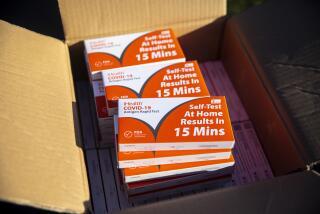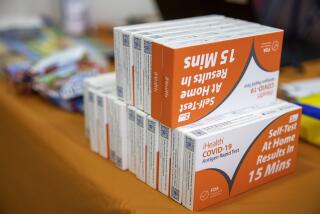Don’t Take One Test as Final, Health Authorities Warn
- Share via
The attorney for a woman who wrongly believed for two years that she carried the AIDS virus says her case demonstrates the need for attention to the problem of inaccurate tests and their potentially shattering impact.
“I don’t think it’s unusual at all,” Miami attorney Steve Mitchel said. “Since we got the verdict, I’ve been contacted by dozens and dozens of people who have had inaccurate test results.”
A Dade County, Fla., jury last September awarded $600,000 in damages to Vernelle Lowder, who learned she was HIV-negative only after being retested. Mitchel said he believes health care providers too easily accept lab results, which he deems a particular problem with AIDS testing because the training is to move the patient quickly from denial to learning to live with the virus.
Although AIDS tests are considered reliable, experts caution that there are possibilities for human error, from mislabeling specimens to misreading the tests. Certain vaccines and medical conditions, such as pregnancy, can trigger false positives.
False negatives also are possible, either from error or because the infection is too recent to show up in tests.
Dr. Charles Schable, chief of the diagnostic serology section of the Centers for Disease Control and Prevention in Atlanta, said the CDC and the Assn. of State and Territorial Public Health Laboratory Directors recommend that all patients with positive HIV results after one test be retested as a precaution.
More to Read
Sign up for Essential California
The most important California stories and recommendations in your inbox every morning.
You may occasionally receive promotional content from the Los Angeles Times.













